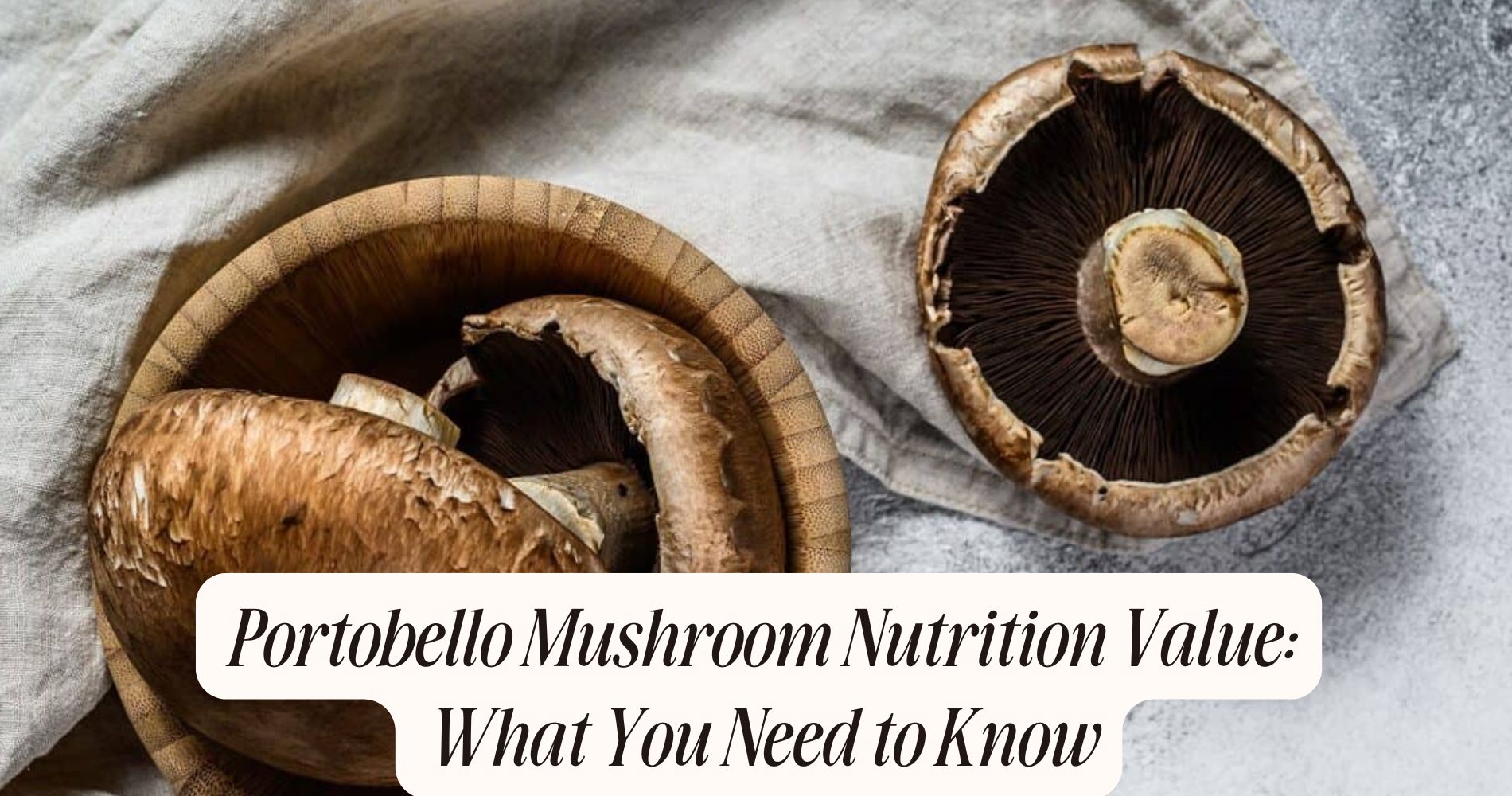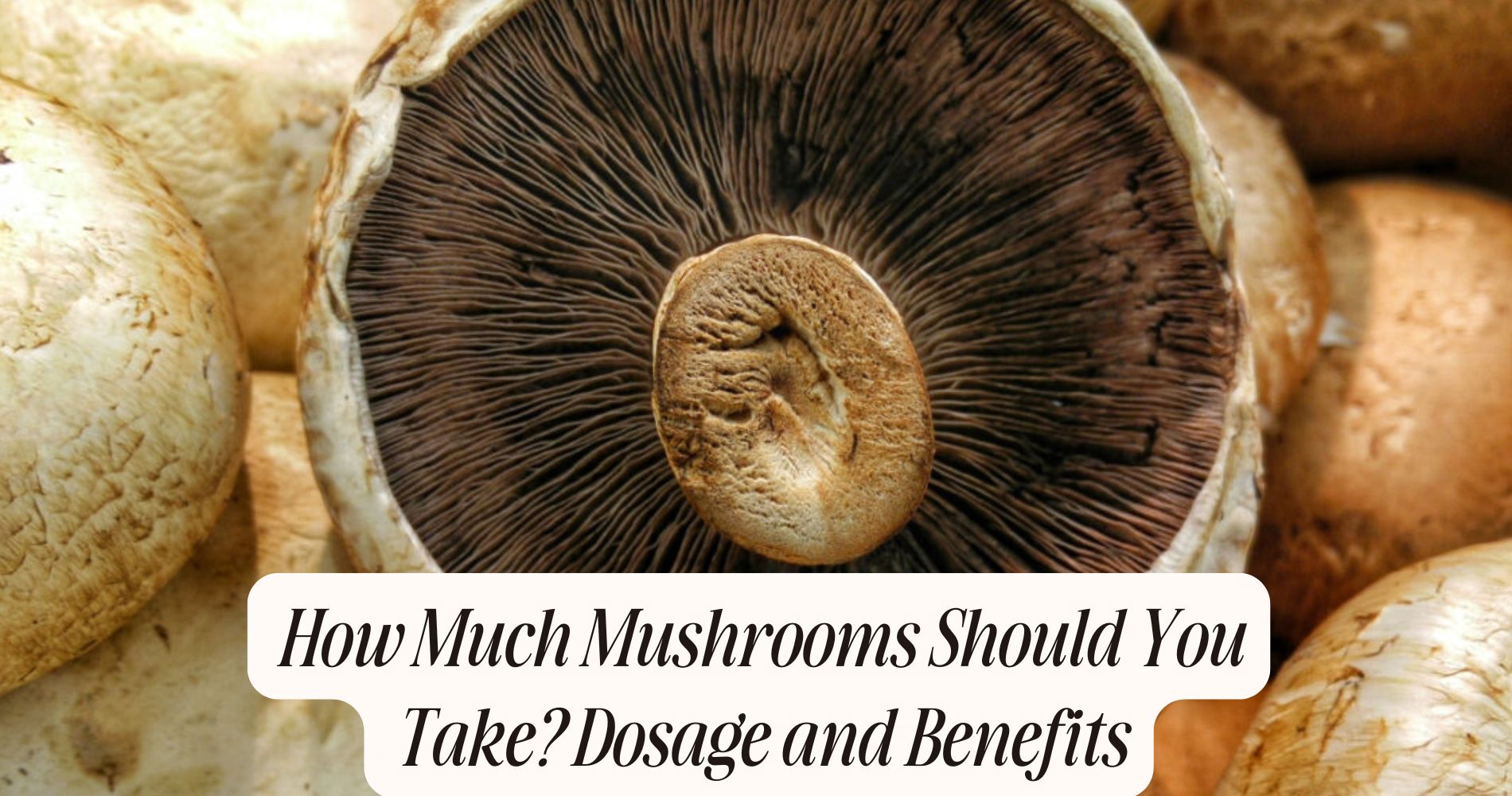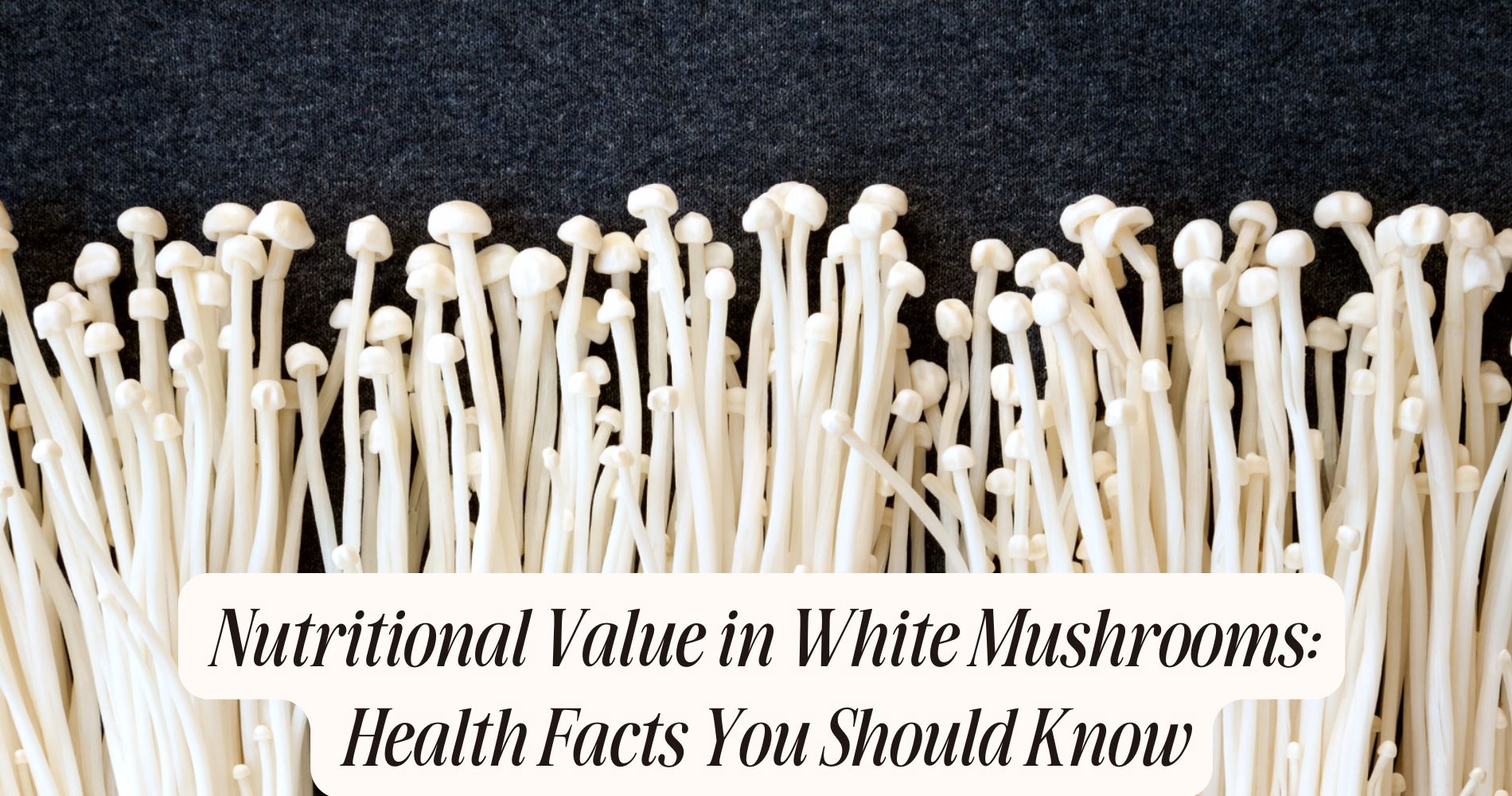
Portobello Mushroom Nutrition Value: What You Need to Know
Portobello mushroom nutrition value makes them a powerhouse of essential nutrients while keeping calories low—just 35 per serving. These hearty mushrooms are packed with B vitamins like riboflavin and niacin, which support energy metabolism, along with minerals such as potassium and selenium for overall wellness. Their antioxidant content, especially ergothioneine, helps combat free radicals and strengthens immune health. Plus, their high fiber content promotes better digestion. Whether grilled, stuffed, or sautéed, Portobello mushrooms add both nutrition and flavor to your meals. Discover how to incorporate them for maximum health benefits!
Overview of Portobello Mushrooms
Portobello mushrooms, with their large, cap-like structure, are a popular choice in various culinary dishes due to their meaty texture and rich flavor.
These mushrooms belong to a broader category of mushroom varieties, which vary in taste and texture. You'll find that portobello cultivation is a well-established practice, often involving controlled environments to optimize growth.

This cultivation process typically includes sterilizing substrates and maintaining precise humidity levels, ensuring a consistent supply of high-quality mushrooms.
Compared to other mushroom varieties, portobellos stand out for their size and culinary versatility, making them ideal for grilling, stuffing, or adding to salads.
Understanding these aspects can enhance your appreciation for this unique ingredient in your cooking endeavors.
Caloric Content and Macronutrients
When considering the nutritional profile of portobello mushrooms, it's important to acknowledge their relatively low caloric content. A typical serving of portobello mushrooms contains about 35 calories, making them an excellent choice for those watching their intake.
The caloric breakdown highlights that they're primarily composed of water, with minimal fat and carbohydrates. With regard to macronutrient ratio, portobello mushrooms consist of approximately 2 grams of protein, less than 1 gram of fat, and about 6 grams of carbohydrates per serving.
This balance makes them a versatile addition to meals, offering both flavor and nutrition without adding significant calories. Incorporating portobello mushrooms into your diet supports a healthy lifestyle while providing essential nutrients.
Vitamins Found in Portobello Mushrooms
Although often overlooked, portobello mushrooms are a rich source of essential vitamins that contribute to overall health. Their impressive nutrient density makes them a valuable addition to your diet.
You'll find significant amounts of B vitamins, including riboflavin, niacin, and pantothenic acid. These vitamins play important roles in energy metabolism, brain function, and maintaining healthy skin.

Additionally, portobello mushrooms contain vitamin D, especially when exposed to sunlight, which supports bone health and immune function. The vitamin content in these mushrooms can help bridge nutritional gaps, particularly for individuals following plant-based diets.
Incorporating portobello mushrooms into your meals not only enhances flavor but also boosts your overall vitamin intake, promoting better health and well-being.
Essential Minerals in Portobello Mushrooms
While many people focus on vitamins, essential minerals in portobello mushrooms also play a fundamental role in maintaining health.
These mushrooms boast a high mineral density, providing you with important nutrients like potassium, phosphorus, and selenium.
Potassium aids in regulating blood pressure and fluid balance, while phosphorus is critical for bone health and energy production.
Selenium acts as a powerful antioxidant, supporting your immune system.
In addition, the unique composition of portobello mushrooms enhances mineral absorption, making it easier for your body to utilize these nutrients effectively.
Antioxidant Properties
Portobello mushrooms are rich in antioxidants, which can play a significant role in protecting your body from oxidative stress.
These mushrooms contain important antioxidant compounds like ergothioneine and selenium. Ergothioneine, in particular, is known for its ability to neutralize free radicals, which are unstable molecules that can cause cellular damage.
By combating these free radicals, the antioxidants in portobello mushrooms help reduce inflammation and support overall health. Studies have shown that a diet high in antioxidant-rich foods can improve your body's defense mechanisms.
Including portobello mushrooms in your meals not only adds flavor but also enhances your nutritional intake, contributing to your body's ability to fight oxidative damage effectively.
Prioritizing these mushrooms in your diet can be beneficial.
Health Benefits of Portobello Mushrooms
When you incorporate portobello mushrooms into your diet, you're not just adding a delicious element to your meals; you're also reaping a variety of health benefits.
These mushrooms are rich in essential nutrients, including B vitamins, which are crucial for energy metabolism and overall health. Their high antioxidant content supports your immune system, helping your body fend off illnesses.

In addition, portobello mushrooms contain potassium, which is known to promote heart health by managing blood pressure levels. Research shows that diets rich in potassium can reduce the risk of cardiovascular disease.
Dietary Fiber and Digestive Health
Incorporating dietary fiber into your meals is crucial for maintaining ideal digestive health, and portobello mushrooms serve as an excellent source. These mushrooms contain about 2 grams of fiber per cup, which aids in promoting regular bowel movements and preventing constipation.
Their high fiber content also supports the growth of beneficial gut bacteria, contributing to overall digestive wellness. By including portobello mushrooms in your fiber-rich recipes, you can enhance your meal's nutritional value while enjoying their rich flavor and texture.
Whether grilled, sautéed, or stuffed, these versatile mushrooms can easily fit into your diet. Prioritizing fiber from sources like portobello mushrooms guarantees your digestive system functions efficiently, ultimately leading to improved health outcomes.
Portobello Mushrooms and Weight Management
Mushrooms like portobellos can play a significant role in weight management due to their low calorie content and high water volume. With only about 35 calories per cup, they're a fantastic option for satisfying hunger without adding excess calories.
The Portobello benefits extend beyond just being low-calorie; they're rich in nutrients and can enhance the flavor of your meals. Incorporating portobellos into your diet through various mushroom recipes allows you to create filling dishes that promote satiety.
For instance, using them as a meat substitute in burgers or stir-fries can effectively reduce calorie intake while maintaining taste. By incorporating these mushrooms into your meals, you can enjoy delicious flavors while supporting your weight management goals.
Cooking Methods to Preserve Nutritional Value
To maximize the nutritional benefits of portobello mushrooms, it's crucial to choose the right cooking methods. Grilling techniques, such as using a moderate temperature, can help retain vitamins and minerals while enhancing flavor.
Avoid high heat and prolonged cooking times, which can diminish their nutrient content. Sautéing methods are also effective; use a small amount of healthy oil and cook over medium heat for a brief period. This approach preserves the mushrooms' texture and nutrients while preventing excessive loss of water-soluble vitamins.

Steaming is another gentle method that keeps nutrients intact. By selecting these cooking techniques, you guarantee that your portobello mushrooms remain both delicious and nutritionally valuable, making them a powerhouse addition to your meals.
Incorporating Portobello Mushrooms Into Your Diet
Adding portobello mushrooms to your diet can enhance both flavor and nutrition. These hearty fungi are versatile and can easily fit into your meal planning. You can grill, sauté, or roast them to add a savory element to various dishes.
Try incorporating portobellos into pasta, salads, or as a meat substitute in burgers. Numerous portobello recipes highlight their natural umami flavor, making them a satisfying option for vegetarians and meat-lovers alike.
Additionally, they're rich in antioxidants, vitamins, and minerals, boosting your overall health. To maximize their nutritional benefits, consider pairing them with other nutrient-dense foods like quinoa or leafy greens.
With a little creativity, portobello mushrooms can become a staple in your meals, providing both taste and essential nutrients.
Elevate Your Wellness with SUPER MUSHROOM GUMMIES
Want to experience the incredible benefits of mushrooms in the easiest way possible? Try SUPER MUSHROOM GUMMIES by Well Gummies! Packed with 10 functional mushrooms, these convenient chewable gummies naturally fuel your brain, energy, and immune system—all without the hassle of cooking. Enjoy the delicious wild berry flavor, free from jitters or crashes, and feel the difference in your focus, clarity, and overall well-being. Ready to supercharge your daily routine? Give your body the support it deserves with Well Gummies today!
Frequently Asked Questions
Are Portobello Mushrooms Safe for Individuals With Mushroom Allergies?
If you have mushroom allergies, portobello mushrooms aren't safe. They can trigger mushroom allergy symptoms like hives or nausea. Consider safe mushroom alternatives, such as tofu or tempeh, to enjoy similar textures without the risk.
How Do Portobello Mushrooms Compare to Other Mushrooms Nutritionally?
When you compare portobello mushrooms to other mushroom varieties, you'll find they offer unique nutritional benefits, including higher fiber content and essential nutrients. This makes them a valuable addition to a balanced diet.
Can Portobello Mushrooms Be Eaten Raw?
Yes, you can eat portobello mushrooms raw. They offer raw mushroom benefits like enhanced flavor and texture. Try incorporating them into salads or sandwiches with raw mushroom recipes that highlight their unique taste and nutrients.
Do Portobello Mushrooms Contain Gluten?
Portobello mushrooms don't contain gluten, making them a safe choice for those with gluten sensitivity or dietary restrictions. Incorporating them into your meals can provide flavor without triggering adverse reactions related to gluten consumption.
How Should Portobello Mushrooms Be Stored for Freshness?
To keep portobello mushrooms fresh, store them in a paper bag within the refrigerator. Avoid airtight storage containers, as moisture builds up. Follow these refrigeration tips to maintain their flavor and texture for longer.
Conclusion
Incorporating portobello mushrooms into your diet can greatly enhance your nutritional intake. With their low caloric content, rich vitamin and mineral profile, and high antioxidant levels, these mushrooms support overall health. Their dietary fiber promotes digestive health, making them a great choice for weight management. By exploring various cooking methods, you can preserve their nutritional value while enjoying their unique flavor. Embrace portobello mushrooms as a versatile ingredient to boost your meals and well-being.




